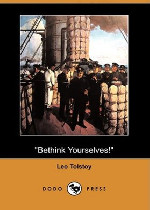
"Bethink Yourselves"(自我思考) 立即阅读
Again war. Again sufferings, necessary to nobody, utterly uncalled for; again fraud; again the universal stupefaction and brutalization of men. Men who are separated from each other by thousands of miles, hundreds of thousands of such men (on the one hand—Buddhists, whose law forbids the killing, not only of men, but of animals; on the other hand—Christians, professing the law of brotherhood and love) like wild beasts on land and on sea are seeking out each other, in order to kill, torture, and mutilate each other in the most cruel way.
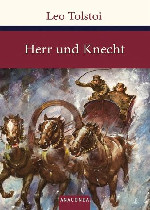
Herr und Knecht (russisch Хозяин и работник) ist eine Erzählung von Leo Tolstoi, die 1895 in der Zeitschrift Sewerny Westnik (Nördlicher Bote) erschien. In dieser Kurzgeschichte reist der wohlhabende Grundstückseigentümer Wassilij Andrejewitsch Brechunov mit seinem demütigen und folgsamen Knecht Nikita zusammen bei einem Schneegestöber durch die Steppe. Wassilij ist ungeduldig und möchte die Stadt schnell erreichen, um dort vor anderen Interessenten ein Stück Wald zu kaufen.

What Shall We Do?(我们该怎么办) 立即阅读
"What Shall We Do?" by Leo Tolstoy explores the evil in men. He looks at men's desire for power, entitlement and money.
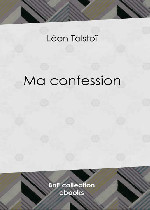
"Ma confession" (en russe : Исповедь [Ispoved']) est une courte œuvre de confession du célèbre romancier russe Léon Tolstoï sur le thème de la mélancolie, de la philosophie et de la religion. Elle a été écrite en 1879 et 1880. Le livre est un récit autobiographique de l'auteur à un moment de sa vie où il traverse une crise de mélancolie existentielle. Il décrit sa recherche de réponses aux questions profondes : « Qu’est-ce qui sortira de ce que je fais aujourd’hui ? de ce que je ferai demain ? Qu’est-ce qui sortira de toute ma vie ? » et « Quel est le sens de la vie ? », sans réponses pour lui et qui rendent la vie « impossible ».
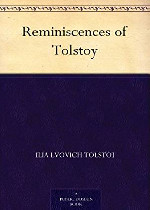
Reminiscences of Tolstoy(托尔斯泰次子回忆录) 立即阅读
IN one of his letters to his great-aunt, Alexandra Andreyevna Tolstoy, my father gives the following description of his children:The eldest [Sergei] is fair-haired and good-looking; there is something weak and patient in his expression, and very gentle. His laugh is not infectious; but when he cries, I can hardly refrain from crying, too. Every one says he is like my eldest brother.I am afraid to believe it. It is too good to be true. My brother's chief characteristic was neither egotism nor self-renunciation, but a strict mean between the two.
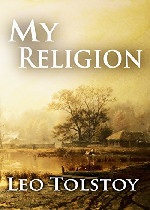
1885. The doctrine of simplification has many adherents in Russia, and when, some time ago, it was announced that the author of "War and Peace" had retired to the country and was leading a life of frugality and unaffected toil in the cultivation of his estates, the surprise to his own countrymen could not have been very great. In this book, he tells us how the decision was formed. He bases his conclusions on a direct and literal interpretation of the teachings of Jesus as expressed in the Sermon on the Mount.
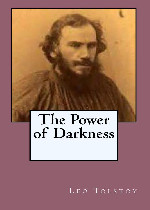
The Power of Darkness(黑暗的势力) 立即阅读
The Power of Darkness (Russian: Власть тьмы, Vlast' t'my) is a five-act drama by Leo Tolstoy. Written in 1886, the play's production was forbidden in Russia until 1902, mainly through the influence of Konstantin Pobedonostsev. In spite of the ban, the play was unofficially produced and read numerous times. The central character is a peasant, Nikita, who seduces and abandons a young orphan girl Marinka; then the lovely Anisija murders her own husband to marry Nikita.
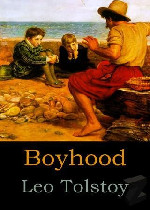
Written from 1852 to 1856, this autobiographical novel was Tolstoy's first publication. The early life of Nikolai, the son of wealthy landowner in Russia, is fully explored, slowly revealing this young boy's inner mind, relationships, and social standing. As he describes his tutor, angelic mother, aloof father, worldly brother, and later his moralistic friend, Nikolai displays a mind given to dreaming and a personality as complex as it is conflicted. As he grows and moves from his country home to his grandmother's mansion in Moscow, Nikolai also struggles at intervals to find a sort of moral balance, which affects his love, his education, and the type of man he might become.
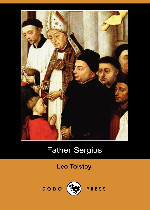
"Father Sergius" (Russian: Отец Сергий, translit. Otets Sergiy) is a short story written by Leo Tolstoy between 1890 and 1898 and first published (posthumously) in 1911.The story begins with the childhood and exceptional and accomplished youth of Prince Stepan Kasatsky. The young man is destined for great things. He discovers on the eve of his wedding that his fiancée Countess Mary Korotkova has had an affair with his beloved Tsar Nicholas I. The blow to his pride is massive, and he retreats to the arms of Russian Orthodoxy and becomes a monk.